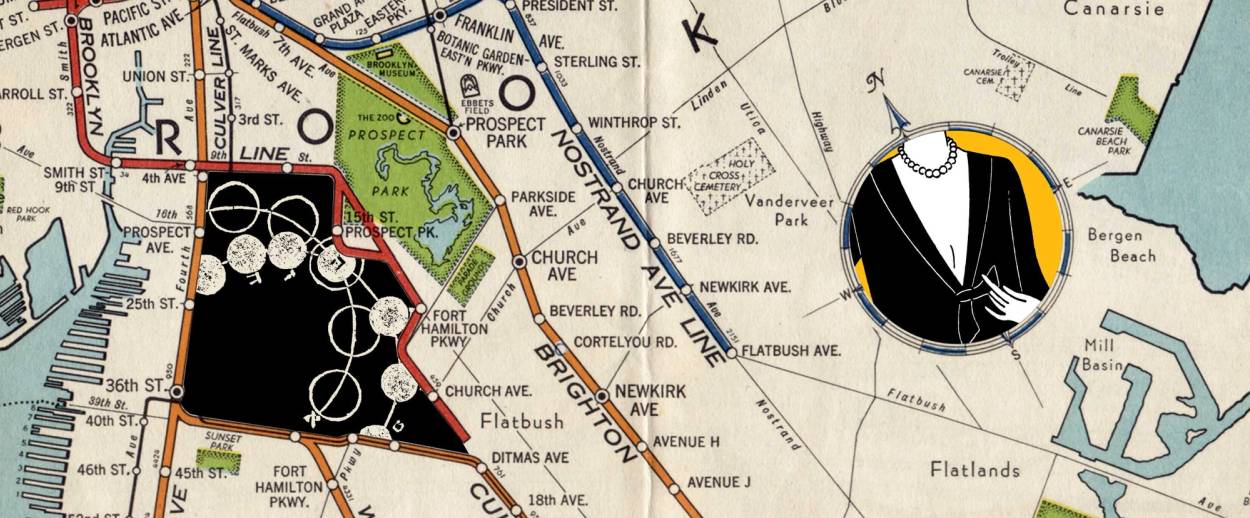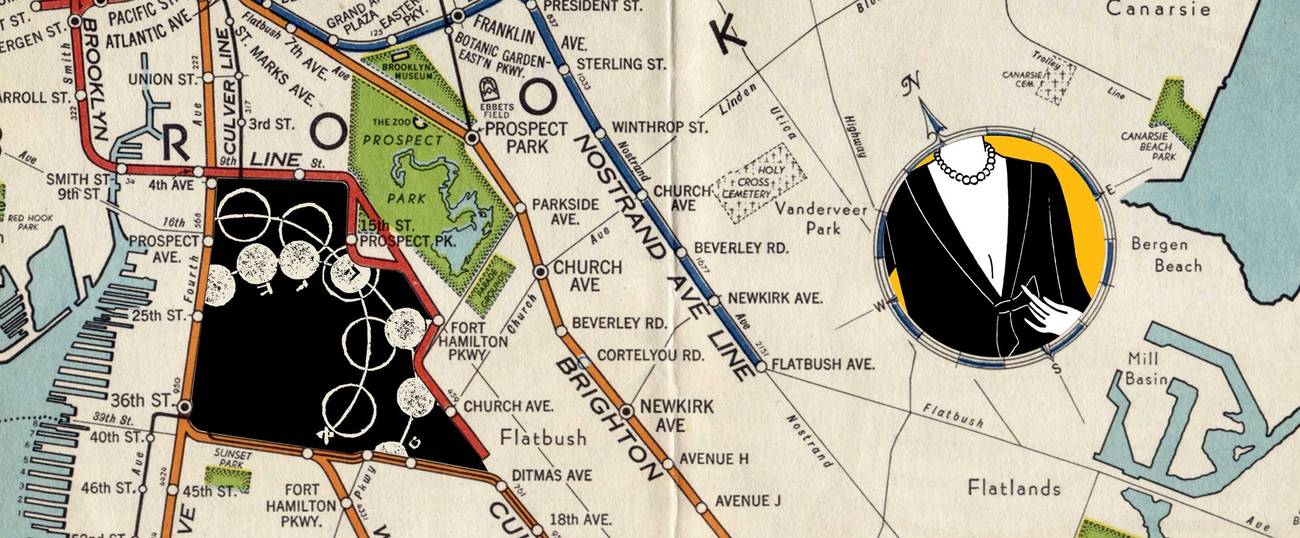Jews in Space
Rokhl’s Golden City: ‘Canada First’ ideology in non-sappy immigrant-tale theater, an invisible feminist in Toronto, an Easter Egg revealed in ‘Futurama,’ and other dispatches from the orbiting Yiddish cosmos




“Dahling, you’re overthinking it.” Moi? Overthinking myself into deadline oblivion? I feigned an expression of outrage, but poorly. This was a few weeks ago, when I found myself sharing gyoza in Chelsea with Pakn Tregermagazine co-editor and posh BBC voice haver David Mazower. (David served the Beeb for decades as a journalist before making the leap to the National Yiddish Book Center last fall.) Months ago I promised him a short—very short—piece for the Pakn Treger. Naturally, I immediately set out hunting down microfilm, comparing Yiddish and English texts, looking for relevant criticism and basically making myself totally crazy. Was I overthinking it? I mean … probably? Could I get a recording of David telling me I’m overthinking it (doesn’t matter what, all of it) for my ringtone? Remind me to ask him.
David hadn’t invited me out just to nudge me about deadlines, of course. He’s way too charming for that. The occasion was the opening of YIVO’s new Jews in Space exhibit at the Center for Jewish History. Any exhibit curated by Eddy Portnoy (this one co-created with Melanie Meyers) is going to be fantastic, and Jews in Space (up through June 2018) doesn’t disappoint. My only quibble is in tackling a subject as big as outer space, the exhibit never goes quite as deep or focused as some others. However, for the Yiddish snob (ahem) there is, for example, a Bundist textbook with astronomical charts in Yiddish (you can see them blown up on the wall of the main exhibition space). For the pop-culture lovers, there’s lots to enjoy—the Jewish contribution to science fiction (and science fact) has been enormous. What really blew me away was finally solving a mystery that’s bugged me for years. In the 2008 Futurama episode “The Beast with a Billion Backs” the Planet Express crew comes up against a mysterious entity called Yivo. Yivo? YIVO? Surely … that was just a weird coincidence, right?
Wrong. Turns out Futurama writer Eric Kaplan was friendly with Dr. Cecile Kuznitz, yes, the same Cecile Kuznitz who teaches at Bard and literally wrote the book on YIVO. Forget about having someone write a hit song about you. Cecile is total #MuseGoals.
***
A few nights ago I saw a new musical titled Old Stock: a Refugee Love Story. It’s a Canadian show that’s been traveling to festivals around the world before landing at the 59E59 theater. I admit, I was excited to see Old Stock because it features my old Klezkanada friend Christopher Weatherstone. Gorgeous, chiseled of jaw, super un-Jewy Chris playing a Jew named Chaim? I mean, I was slightly skeptical. My skepticism was happily unwarranted. Old Stock, based on the real-life family of playwright Hannah Moscovitch, is unlike any immigration story you’ll see this year. That it’s based on real people goes a long way to ensure that Old Stock never hits a cloying or false note. And yes, Chris is 100 percent believable as the haunted but gentle Chaim.
Don’t get me wrong, the show is funny, outrageous, sexy, irreverent, and not afraid to make you cry like a baby as you follow Chaim and Chaya from the moment they get off the boat in Halifax through their decades-long struggle to make lives as new Canadians. But Old Stock is quite unlike the sweetly sentimental immigration narratives American Jews are used to. (I’m thinking of a certain jukebox immigration musical from two summers ago and cringing.) Any show that opens with a Geoff Berner composition (Geoff being the standard bearer of contemporary Canadian political protest song) is signaling that no punches will be pulled (and a high level of F-bombs will be dropped, be warned).
Old Stock carries its pro-immigrant, refugee empathetic message lightly. The story and songs (perfectly led by the wildly talented Ben Caplan) are absolutely entertaining in themselves. But make no mistake, the show is serious, in a seriously Canadian way. Americans may be unfamiliar with the term, but ‘old stock’ is a dog whistle phrase particular to Canadian politics. It refers to white Canadians, usually of British extraction. Like “America First,” it’s a phrase that belonged to— and has mostly stayed in—an uglier, long-ago era. That is, until then-Prime Minister Steven Harper invoked “old stock” Canadians in 2015 in the midst of the national debate about refugees in Canada. The past is never past as they say…
I had coffee with Crime Lady Sarah Weinman last weekend. Sarah and I go back what feels like a hundred years, but is more like, oh, 18 or so, to when we were both newcomers to Klezkanada. In the intervening years, Sarah has produced a truly impressive body of work. This fall she will be releasing her highly buzzed-about true-crime book, The Real Lolita:: The Kidnapping of Sally Horner and the Novel That Scandalized the World. That might be enough for most writers. But Sarah isn’t most writers. In April, the NYRB Classics imprint is bringing out a new edition of Helen Weinzweig’s Basic Black With Pearls featuring an illuminating afterword by Sarah. When I saw her last week Sarah pressed Basic Black into my hand and said, You are going to love this. She is us. We are her.
Readers, she was not wrong. Not that she or I can quite identify with the story of Shirley Silverberg Kaszenbowski, the “invisible woman,” as she travels the world in pursuit of her shadowy secret-agent lover (or does she?). But, the book, an “interior feminist espionage novel” as Sarah calls it, is a revelation whose prose made me want to stand up every few pages and yell “THIS IS SO BLOODY GOOD.” In struggling to find any comparison for Basic Black my mind went to the work of Doris Lessing and Chantal Akerman, artists who pushed every artistic boundary to find new ways of portraying female subjectivity. Reading Basic Black made me think that we still don’t know what women’s stories can sound like away from the cacophony of male opinions, male fantasies, male demands.
Basic Black is also a deeply specific story about a Polish-Jewish woman haunting the streets of Toronto, crisscrossing time and space, feverishly pulling apart and reassembling her own narrative. Sarah notes that Weinzweig told her editor to read The Joys of Yiddish. It might seem an odd request for a gem-like piece of high modernist prose, but it makes sense. Shirley’s story draws us in because, as with all great literature, the specifics make the universal. As an artist, and reader, there is no greater, more joyful, discovery.
***
Attend: Chris Weatherstone, Sarah Weinman, Geoff Berner. Those are just a few of the amazing humans I’ve met over the years at Klezkanada. Do you like to meet amazing humans and play music and dance all night? The theme this year is Uprising/Rising Up and is sure to be terrific fun, August 20-26.
Pesakh: This weekend I picked up my Yiddish Farm Shmura Matzo at the JCC. Turns out I had just missed YIVO’s Eddy Portnoy and behind me in line was the wonderful scholar of Yiddish in America, Jeffrey Shandler. Shtetl Manhattan! Yiddish Farm balebos Yisroel Bass tells me there’s still a few days left to order Yiddish Farm Matzo from organicpassover.com. (Last possible day to order is March 26.) If you’re looking for a cultural/third Seder, as always New York offers an embarrassment of riches. There’s the Yiddish Artists and Friends (YAFAC) Seder on March 26 and the Congress for Jewish Culture Yiddish Third Seder on April 3.
ALSO: Two museum events I’m looking forward to: Memory Unearthed: The Lodz Ghetto Photographs of Henryk Ross at the Museum of Jewish Heritage (reviewed in Tablet, alas, unfavorably in its MFA Boston version last year) and, one night only, my brilliant friend Laura Levitt is in town to talk about the Jewish Museum’s Constructed Memory: The Holocaust in Photography and Film. And finally, not to be missed, a rare New York appearance by Moscow-based guitar god (and Klezkanada alum) Vanya Zhuk, at the New York Klezmer Series, March 29, 7 p.m.- 11 p.m., at Funky Joe’s on West 56th Street in Manhattan.
Rokhl Kafrissen is a New York-based cultural critic and playwright.